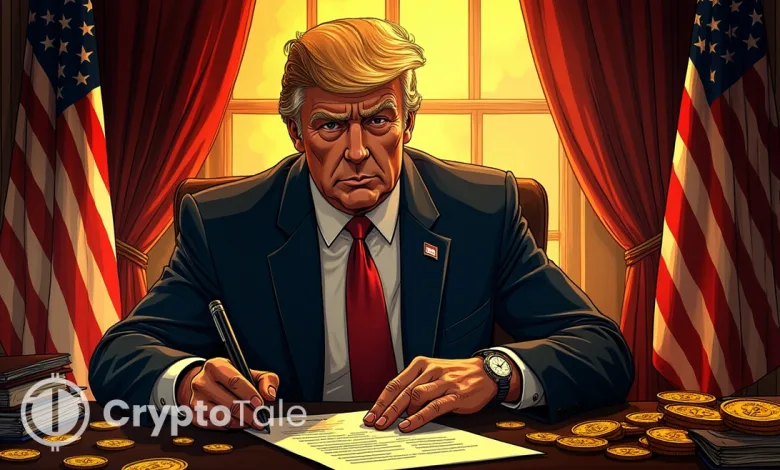Historic Win: Trump Signs First Ever Crypto Bill into Law

- Trump signed the first-ever U.S. crypto bill, repealing the IRS DeFi broker reporting rule.
- The bipartisan repeal removes tax rules DeFi platforms couldn’t technically comply with.
- The new law boosts U.S. crypto innovation by removing barriers and protecting user privacy.
President Donald Trump has signed the first crypto-related bill in U.S. history, overturning a controversial IRS rule targeting decentralized finance. The legislation, introduced by Congressman Mike Carey, officially repeals the “DeFi Broker Rule” passed during the final weeks of the Biden administration.
The new law marks a major milestone for the crypto industry. It removes reporting requirements that many believed were incompatible with the way decentralized platforms operate. Trump signed the bill into law on Thursday, surrounded by lawmakers and crypto advocates.
Earlier, the Congress had voted to repeal the rule through the Congressional Review Act. Both the House and Senate supported the repeal in a bipartisan vote, reflecting growing momentum for pro-crypto policies in Washington.
Under the rule, the IRS classified DeFi exchanges as brokers, requiring them to collect and report users’ tax data. The rule stemmed from the 2021 Infrastructure Investment and Jobs Act and aimed to increase tax compliance. However, critics argued that DeFi platforms lacked the technical ability to identify or report user data.
Representative Carey said the law protects innovation and taxpayer privacy. He noted that DeFi protocols are not intermediaries and cannot comply with traditional financial rules. “This rule would have overwhelmed the IRS with forms it couldn’t even process,” Carey stated.
Related: Trump Claims World Leaders “Kissing His Ass” Over Tariffs
Industry leaders warned that the rule would have pushed innovation offshore, threatening DeFi development in the U.S. due to the high regulatory burden. Privacy advocates also raised alarms over risks to user anonymity and data security.
The repeal follows a sharp shift in tone from the federal government. Trump has positioned himself as a strong supporter of digital assets. On the campaign trail, he pledged to become a “crypto president” and encourage blockchain innovation.
In March, Trump signed an executive order to create a federal Bitcoin reserve. His administration also formed a working group to draft new digital asset regulations. White House AI and crypto advisor David Sacks called the IRS rule a “midnight regulation” of the Biden era.
This latest move marks a turning point for the U.S. crypto industry, signaling the growing political will to support blockchain innovation and limit government overreach. With increased regulatory clarity, developers and investors may now see the U.S. as a more favorable landscape for crypto.




